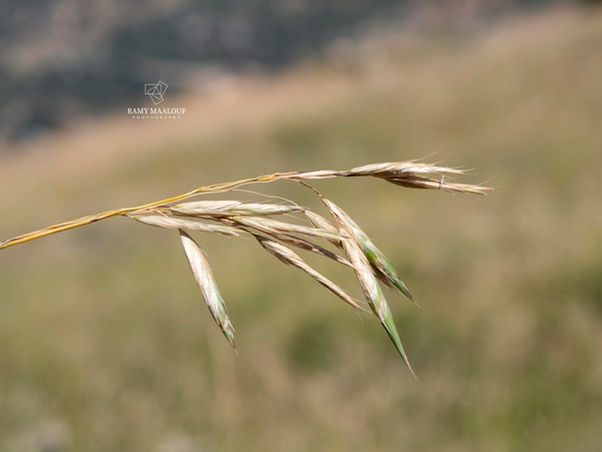Family |
Poaceae
Bromus tomentellus
Boiss.
Bromus tomentellus Boiss.
(Nouvelle Flore du Liban et de la Syrie, vol. 1, Pl. XXXV nº 3; 1966)
Life-form & habit: Perennial with a thick, oblique rhizome. Fertile and sterile stems enclosed at the base in a dense, reticulated fibrous sheath. Culms solitary or tufted, 20–60 cm tall, glabrous and smooth.
Leaves: Lower sheaths usually densely puberulent, sometimes becoming glabrescent; upper sheaths glabrous. Ligule very short, truncate. Blades, especially the lower, shortly puberulent or scabrous, and rather strongly hispid.
Inflorescence & flowers: Erect panicle, compact or contracted, rather sparse. Branches solitary or in pairs, short, generally bearing a single spikelet. Spikelets compressed, 2 cm or longer (excluding awns), with 6–9 florets loosely arranged on the rachilla, pale green or tinged violet.
Glumes: Linear, the upper slightly broader but scarcely longer than the lower.
Lemmas: Slightly over 1 cm long, with faint veins and a clearly bidentate apex, prolonged by an awn as long as or slightly shorter than the body.
Phenology: Flowers from April to June, or later at higher altitudes.
Habitat & elevation: Pastures in montane to subalpine regions; typical of semi-arid climates.
Lebanese distribution: Mm. Dimane, Hasroun, Cedars, Jabal Barouk, Jabal Kneissé, Afka; Me. Jabal Sannine, Yammouné–Dimane, Rikbat el-Jamal, Dahr el-Qodib, Qornet es-Saouda; Met. near Kfar Zabed.
Syrian distribution: A.L. Ouadi el-Harir; Herm. NE of Hasbaya, Hermon.
Native range: Iran, Iraq, Kriti, Lebanon-Syria, North Caucasus, Palestine, Transcaucasus, Turkmenistan, Türkey. (KEW)









